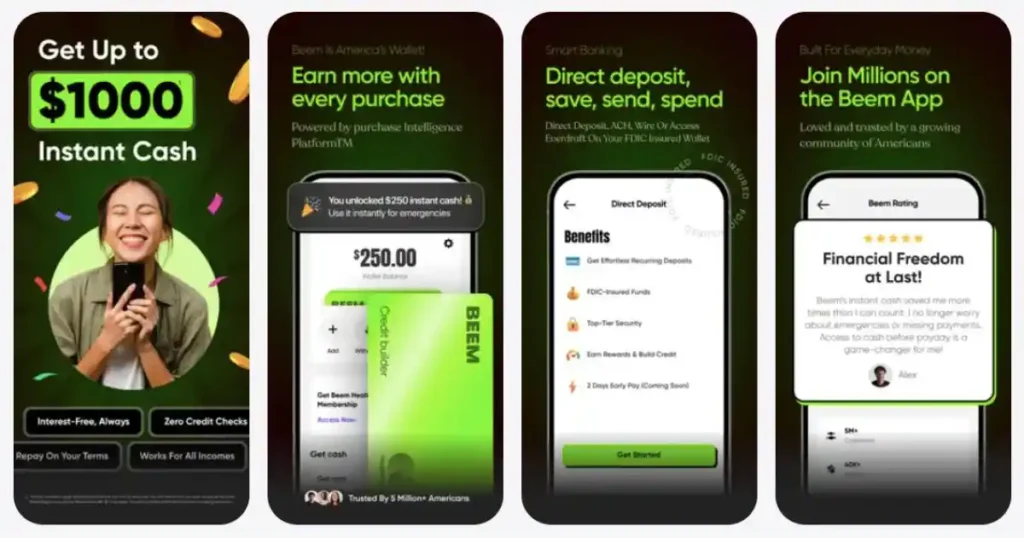Table of Contents
Cashiers may often struggle to make ends meet. Emergency savings accounts, short-term loans, or budgeting tools can go a long way as financial solutions. Setting aside a portion of earnings for unexpected expenses helps provide a financial cushion. Cashiers can also explore microloans or flexible credit options to cover urgent costs. Mobile apps and budgeting tools can track daily spending, ensuring money is available. This blog explores financial solutions for cashiers to handle unplanned bills.
Cashiers often face unique financial challenges due to variable wages, limited benefits, and the unpredictability of everyday expenses. Most work hourly, making it challenging to manage unforeseen bills or plan for long-term financial stability.
Managing Money on an Hourly Wage
Managing money on an hourly wage can be tough, but it’s possible to make ends meet with careful planning. Creating a detailed monthly budget for rent, utilities, and groceries can help you stay on track. Building an emergency fund will provide support for unexpected costs. Exploring additional income streams, such as part-time work or gig opportunities, can boost earnings.
Also Read: Top 10 Cool Part-Time Jobs
Why Cashiers Need Financial Solutions for Unplanned Bills
Cashiers often face financial challenges due to unpredictable earnings and limited access to benefits like healthcare or paid time off. Without an emergency fund or financial security, they may have to rely on credit or loans, worsening their situation. Smart money management strategies like budgeting, tracking spending, and prioritizing essential expenses are crucial to avoid this. Setting aside a small emergency fund and using financial apps can help cashiers stay organized, reduce reliance on credit, and build savings. Beem’s budget planning tool The Better Financial Feed™ can help you plan ahead to stick to your financial goals.
How Beem Everdraft™ Can Help Cashiers Stay Financially Secure
Instant cash advances can be a helpful option for covering unplanned bills without interest or fees, provided they come from a reliable source. Some financial apps or credit card companies offer cash advances with no interest for a limited period or minimal fees. Based on your spending patterns in the last few months, Beem predicts how much you should spend on different categories like fast food, restaurants, shopping, entertainment, education, transportation, groceries, etc.
Understanding the Financial Challenges of Cashiers
Cashiers typically earn modest hourly wages, fluctuating based on hours worked or store demand. Many also lack benefits like health insurance or paid leave, making it harder to manage unexpected expenses.
The Reality of Living Paycheck to Paycheck
Living paycheck to paycheck can be incredibly stressful, especially for cashiers. Most of a paycheck goes toward essentials like rent, utilities, and groceries, leaving little for savings or unplanned bills. Cashiers may struggle to cover these costs when emergencies arise, often turning to credit or loans.
Unpredictable Expenses Can Wipe Out Savings
Even small, unexpected costs like a car repair or appliance breakdown can quickly drain hard-earned savings if there’s no financial cushion. Unforeseen costs often arise inconveniently, forcing cashiers to choose between essential bills and urgent repairs or treatments. These emergencies can lead to debt, stress, or missed payments without enough savings or financial backup. A financial safety net is crucial for managing disruptions and maintaining stability.
Limited Work Hours and Wage Constraints
Limited work hours and wage constraints pose significant challenges for cashiers, as they often rely on hourly pay without the stability of a fixed salary. Irregular schedules, reduced hours, or seasonal fluctuations can result in unpredictable income, making budgeting and saving for the future difficult. With hours varying from week to week, it becomes hard to predict earnings, leading to financial stress.
Rising Cost of Living with Stagnant Wages
The rising cost of living and stagnant wages create a significant financial challenge for cashiers. As prices for essentials continue to rise, many cashiers struggle to cover their expenses on their current wages. This growing disparity makes it harder to save, manage emergencies, or even meet basic needs, leading to financial strain. As a result, they are often forced to make difficult choices between paying bills and addressing unexpected expenses.

Smart Budgeting Strategies for Cashiers
Cashiers can employ several smart budgeting strategies to reduce everyday expenses. They can use discounts, coupons, and sales to reduce expenses. They can set spending limits and avoid impulse buys by waiting 24 hours before making non-essential purchases. They can also allocate a portion of each paycheck for savings or retirement.
How to Budget on a Low and Fixed Income
Budgeting on a low and fixed income requires discipline and careful planning. Start by tracking all your monthly expenses to understand where your money goes. Prioritize essential costs and cut back on non-essential spending. Create a budget that allocates specific amounts for each category, ensuring you don’t overspend.
Track Every Dollar You Earn and Spend
By closely monitoring your finances, you understand where your money goes, making it easier to identify areas to cut back. Use budgeting apps, spreadsheets, or a simple notebook to log your income and expenses. This helps prevent overspending, avoid unnecessary purchases, and stay within budget. Both digital and manual methods help prioritize essential expenses and avoid unnecessary spending.
Use the 50/30/20 Budgeting Rule
The 50/30/20 budgeting rule provides a simple framework for managing finances on a low income. Allocate 50% of your income to essentials like housing, utilities, and groceries. Reserve 30% for wants, such as entertainment, dining out, or shopping. The remaining 20% should go toward savings or debt repayment, helping you build an emergency fund or pay off existing debts. This method ensures your essential needs are met, allows some flexibility for spending, and encourages saving for future goals.
Adjust Your Budget to Manage Unplanned Bills
Adjusting your budget to manage unplanned expenses requires flexibility and proactive planning. When unexpected bills come up, review your current budget and reallocate funds from less essential categories. Cut back on non-essentials, reevaluate unused subscriptions, and avoid impulse purchases to free up money for urgent needs.
Ways to Reduce Monthly Expenses
Start by canceling unused subscriptions and limiting dining out to reduce monthly expenses. Opt for home-cooked meals and meal prepping to save on food costs. Look for discounts, use coupons, and choose generic brands when shopping. Lower utility bills by turning off lights, unplugging electronics, and adjusting thermostats.
Take Advantage of Employee Discounts
Many companies offer their employees discounts on products, services, or memberships, ranging from retail items to gym memberships or travel services. Always check with your employer to see what perks are available. For cashiers, store discounts on groceries, clothing, and household essentials are especially valuable. These discounts allow employees to purchase necessary items at a reduced cost, helping stretch their budgets.
Save on Transportation and Utility Bills
To save on transportation, consider carpooling with coworkers or using public transit to reduce fuel and parking costs. Regular vehicle maintenance improves fuel efficiency and reduces repair expenses. Unplug electronics when not used for utility bills and opt for energy-efficient appliances like LED bulbs. Sealing windows and using weather stripping help improve insulation. Many utility companies also offer cost-saving programs for low-income households.
Buy in Bulk and Use Cashback or Discount Apps
Buying groceries and household essentials in bulk often lowers the per-unit price, helping you save money. Cashback apps like Rakuten and Honey provide rebates or discounts on purchases, while discount apps alert you to sales and coupons. Combining bulk buying with these apps ensures you get the best deals and maximize savings. Many stores also offer loyalty programs that reward purchases with discounts or points.
Building an Emergency Fund on a Cashier’s Salary
Building an emergency fund on a cashier’s salary can be challenging but possible with discipline and planning. Start by setting a small, realistic goal, like saving $500 to $1,000. Then, allocate a portion of each paycheck, even a small amount, towards this.
Why Every Cashier Needs an Emergency Fund
Every cashier needs an emergency fund to provide financial security during unexpected expenses. An emergency fund helps prevent relying on credit cards or loans, which can lead to debt. Having a financial cushion ensures cashiers can handle life’s surprises without added stress, providing peace of mind and greater financial stability.
A Small Cushion Helps Handle Unexpected Expenses
For cashiers, saving just $5–$10 from each paycheck may not seem like much, but over time, it adds up. This cushion can be a lifesaver when unplanned bills, like car repairs or medical expenses, arise. Without savings, cashiers may need to rely on credit cards or loans, potentially leading to debt. Cashiers can handle emergencies more smoothly by setting aside small, regular amounts.
Reduces the Need for High-Interest Loans
Building an emergency fund helps cashiers avoid relying on high-interest loans or credit cards during financial crises. Without a savings cushion, unexpected expenses may force cashiers to turn to payday loans or credit cards, leading to debt traps and mounting interest payments. By setting aside small amounts regularly, cashiers can create a financial safety net that covers emergencies without incurring costly borrowing fees.

How to Build an Emergency Fund on a Tight Budget
Building an emergency fund on a tight budget starts with saving small amounts, like $5 or $10 per paycheck. Prioritize savings by setting aside money before spending on non-essentials. Use windfalls like tax refunds or bonuses to boost your savings. Automate transfers to a separate savings account, ensuring consistent contributions.
Automate Small Savings Contributions
Set up automatic transfers from your checking account to a separate savings account, even if it’s only $5 or $10 per paycheck. This ensures that saving becomes a consistent habit. Keeping the savings separate from your checking account makes you less likely to spend money impulsively. Over time, these small, regular contributions will add up, giving you a financial cushion for unexpected expenses without disrupting your regular budget.
Use Windfalls and Extra Earnings Wisely
Using windfalls and extra earnings wisely can rapidly grow your emergency fund. When you receive unexpected money, whether a tax refund, a bonus, or side job income, resist the urge to spend it on non-essentials. Instead, direct it straight into your savings account to boost your emergency fund significantly. These one-time increases can help you build a financial cushion more quickly, reducing the stress of unforeseen expenses.
Use Beem Everdraft™ Instead of Tapping into Savings
Beem provides fast approval for cash advances with no credit checks, giving you quick access to the funds you need. Borrow between $10 and $1,000 instantly, using Beem Everdraft™, and explore flexible repayment options that cater to your unique financial situation.
Emergency Cash Solutions for Cashiers
If an urgent need arises, consider using employee discounts, cashback apps, or rebates to save on essentials. For immediate cash needs, explore options like credit unions or family loans, avoiding high-interest payday loans.
What to Do When You Can’t Afford an Unexpected Bill
Contact the creditor to discuss payment plans or extensions when you can’t afford an unexpected bill. Prioritize essential bills to avoid penalties or service disruptions. If you have an emergency fund, use it to cover the cost. Look for local financial assistance programs or charities that offer support. Act quickly to manage the situation and prevent further financial strain.
Prioritize Immediate Expenses
When managing unplanned bills, it’s crucial to prioritize immediate expenses. Start by covering your essentials, which are vital for your daily well-being. If funds are tight, consider postponing or negotiating non-essential bills like subscriptions or entertainment costs. After securing your basic needs, address other critical bills, such as transportation or medical costs.
Find Temporary Side Gigs for Extra Income
Temporary side gigs are a great way to supplement your income and ease financial stress. Platforms like Uber Eats, DoorDash, and Instacart offer delivery jobs with flexible hours. At the same time, freelance work in writing, graphic design, or virtual assistance can be found on websites like Upwork or Fiverr. You can also sell unused items like clothing, electronics, or furniture on platforms like eBay, Facebook Marketplace, or Poshmark to quickly generate extra cash.
Consider a Cash Advance Instead of a Payday Loan
Cash advances, often available through credit cards or a bank, tend to have lower interest rates than payday loans and more flexible repayment terms. While they still carry fees, they may be a more affordable option for short-term borrowing. However, paying it off immediately is important to avoid high interest charges.
Why Beem Everdraft™ is a Smarter Alternative to Payday Loans
Beem Everdraft™ offers a flexible repayment structure and the ability to borrow without a credit check to ensure that it’s available to a broader range of individuals, even those with less-than-perfect credit.
No Interest or Late Fees
Unlike credit cards, Beem provides a stress-free cash advance solution and doesn’t charge high interest rates or hidden fees, making it a more affordable option for short-term financial needs.
Instant Access to Emergency Funds
Beem provides fast approval for cash advances with no credit checks, giving you quick access to the funds you need. Borrow between $10 and $1,000 instantly, with flexible repayment options that cater to your unique financial situation.
Flexible Repayment Without Stress
Beem Everdraft™ offers a flexible repayment structure and the ability to borrow without a credit check to ensure that it’s available to a broader range of individuals, even those with less-than-perfect credit.
Avoiding Financial Pitfalls as a Cashier
Save small amounts regularly for emergencies to prevent reliance on high-interest loans. Use employee discounts and cashback apps to reduce costs. Be mindful of impulse spending and use public transportation to save on commuting.
Also Read: Part-Time Cashier Jobs
Common Money Mistakes & How to Avoid Them
Common money mistakes include living beyond your means, neglecting savings, and relying on credit. To avoid these, create a budget and track your expenses to stay within your income. Start saving small amounts regularly for an emergency fund. Pay off credit cards in full each month to avoid high-interest debt.
Not Budgeting for Irregular Expenses
Unexpected expenses like car repairs, medical bills, or annual subscriptions can disrupt your budget if you’re only planning for regular monthly costs. To avoid this, create a separate fund for irregular expenses. Estimate how much you’ll spend annually on gifts, car maintenance, or insurance premiums, and divide that amount by 12 to set a small monthly savings goal.
Relying on Credit Cards for Basic Necessities
While credit cards can be helpful in emergencies, relying on them for everyday expenses like groceries, utilities, or rent can quickly lead to financial strain. Create a budget that prioritizes savings for emergencies. If you must use a credit card, pay off the balance in full each month to avoid interest charges.
Not Taking Advantage of Financial Assistance Programs
Many assistance programs like food aid, utility discounts, and medical support can alleviate financial strain during difficult times. It’s important to research local and government programs that could be available to you, especially when facing challenges. By applying for these programs, you can reduce immediate financial pressures and manage your finances more effectively.
Alternatives to Beem Everdraft™ for Financial Assistance
If you’re seeking financial assistance but want to explore options beyond Beem Everdraft™, there are several alternatives, such as Earnin, Dave, Brigit, Chime’s SpotMe, and Payday Loans. It’s important to understand the fees and repayment terms before borrowing entirely.

Other Ways to Secure Emergency Funds
Other ways to secure emergency funds include selling unused items on platforms like eBay or Facebook Marketplace for quick cash. Taking on short-term side gigs can also help boost income. Borrowing from family or friends with a clear repayment plan is another option. Consider liquidating investments like stocks or using a low-interest personal loan from a credit union.
Employer Hardship Assistance Programs
Employer hardship assistance programs may offer interest-free loans, grants, or salary advances to help cover urgent expenses without the burden of high-interest debt. Some employers provide benefits like food assistance, transportation support, or temporary adjustments to work schedules. You can inquire about available options to access this support by contacting your HR department or employee services.
Community & Government Assistance Programs
Community and government assistance programs can provide crucial support during financial hardship. Programs like SNAP (Supplemental Nutrition Assistance Program) help with grocery expenses, while rental assistance helps with rent during tough times. Utility relief programs help reduce electricity, water, and heating costs, maintaining essential services.
Side Hustles & Gig Work for Extra Cash
Popular side hustle options include delivery driving (UberEats, DoorDash), ride-sharing (Uber, Lyft), and freelancing (writing, graphic design, or virtual assistance) through platforms like Fiverr or Upwork. Other opportunities include pet sitting, tutoring, babysitting, or offering cleaning services. You can also sell handmade goods on Etsy and unused items on eBay or Facebook Marketplace.
Also Read: Effective Budgeting Tips for Retail Workers
FAQs on Financial Solutions for Cashiers to Handle Unplanned Bills
Financial solutions for cashiers can help them manage limited incomes and unexpected expenses. Start by creating a budget to track income and essential expenses. Then, explore available financial assistance programs, such as food or utility relief.
What should cashiers do when facing an unexpected bill?
When cashiers face unplanned bills, they should cut back on non-essential spending by reducing discretionary expenses like dining out or entertainment. Then, to boost earnings, they should look for side income through flexible gigs such as food delivery, pet-sitting, or freelancing.
How much should cashiers save for emergencies?
Cashiers should start by saving at least $500 for initial emergencies. Once that goal is met, aim to build up savings equal to three months of essential expenses, including rent, utilities, and food. This provides a more secure financial cushion for unexpected situations.
What budgeting tips help cashiers manage bills effectively?
Cashiers can manage bills effectively by tracking expenses to understand where their money goes. Prioritize essentials, ensuring these are covered first. By sticking to a budget, avoiding unnecessary spending, and utilizing available financial tools, cashiers can stay on top of their bills and avoid relying on high-interest loans.
Are there financial assistance programs available for cashiers?
Yes, there are several financial assistance programs available for cashiers. Rental assistance can help with housing costs, while food aid programs such as SNAP (Supplemental Nutrition Assistance Program) support grocery expenses. Many employers also offer hardship funds to assist employees during times of crisis.
Conclusion: Take Control of Your Finances as a Cashier
As a cashier, managing your finances is essential for stability and peace of mind. Budgeting is among the best financial solutions for cashiers to handle unplanned bills. Start by tracking expenses and prioritizing essentials like rent and utilities. Build an emergency fund, even small, to cover unexpected costs. Consider side hustles for extra income. Utilize available resources like financial assistance programs and employer benefits when necessary. Consistent savings and careful planning are key to achieving long-term financial security and reducing stress during tough times.
Beem Everdraft™ provides instant, no-interest cash advances to handle financial emergencies. Use Beem’s budgeting tools to track expenses, save money, and prepare for financial challenges.
Stay financially secure — download the Beem app here.















































